#Privacy Violations
Explore tagged Tumblr posts
Text
I'm not Australian so I don't know much about this but apparently there's a push for a new law that would make all social media users have to use IDs? This is already a policy for Facebook but your username on Facebook is your real name anyway. On sites like Tumblr, people want to remain anonymous. While I personally don't care about anonymity, this could out teenagers to their parents as LGBTQ+ and make them a bigger target for bullying. If you are Australian or otherwise more knowledgeable about this bill, let me know more about it so I can help.
38 notes
·
View notes
Text
For everybody that follows me that lives in the United States, contact your local state representatives about the KOSA bill and how it is unconstitutional, it is a privacy violation and it is an overreach of government power. The government should not have this much power, we are not North Korea, we are in the free country of the United States of America. And the fact that our rights are constantly taken from us every day is a problem. Contact your local state representatives, get angry they already don’t listen to us but maybe they’ll listen to what if we contact them en mass 
#stop kosa#kosa bill#fuck kosa#kosa act#kosa#data privacy#online privacy#privacy violations#privacy violation#unconstitutional
58 notes
·
View notes
Text
Usually, I consider Morning Brew an entertaining element of my morning, but not necessarily the most on-topic (for my interests) of the newscasts I listen to.
However, they had a LOT of good topics today, like:
an overview of the tax and welfare elements of the budget that Biden is proposing (understandably, most of the others are focused on the immigration policy), and how it relates to the election
the increasing number of incidents with Boeing, touching on the suspicious death of a whistle-blower
automakers are sharing your personal information with insurance companies without your knowledge (consent was gained in the tiny fine print), and the expected involvement of the FTC
#current events#politics#united states#domestic politics#boeing#taxes#tax policy#privacy violations#ftc#Phoenix Politics
51 notes
·
View notes
Text
YouTube is Analyzing everything about you.
No I'm serious. Everything. Today I checked my YouTube settings, because I'm not particularly happy with YouTube, and the way they seem to be catering to and protecting it's extremist far right misogynistic racist radicals. Wow, what a shocker! They also seem to be censoring everyone else on the platform who don't share these dangerous and harmful ideals... God forbid I bring logic and reasoning into an argument right!?
But that's when I discovered just how insidious the site truly is .. mind you, all kinds of people use YouTube, and they are absolutely deadset on letting us know: HEY, DID YOU KNOW THAT KIDS USE THIS SITE TOO!!!
And yet, they bully and defame anyone who preaches equality and love, Rather than unsubstantiated and unearned hate ..? hmmm... Very SUS indeed...
But I'm talking about their insidious practices regarding information collection. Every site has cookies, unfortunately there is no such thing as privacy anymore, that is true .. but YouTube takes it up a notch with invasive and disgusting tactics. They analyze how old you are, where you are, they may even speculate on your employment status, your home, and whether you're married and have kids or not .. EVEN YOUR EDUCATION LEVEL. (am I sensing some classism too?)
The list goes on...
Also, YouTube seems to know that no, I currently don't have kids, and yet they keep pushing baby ads, and pamper commercials at me? Seems not creepy or predatory at all! Oh, YouTube...Are you as a PLATFORM trying to indoctrinate me, and put me into your little placid 1950s box? I think you are!!
As I brought up earlier— they prey on all types of people, treat the ones that fit their outdated ideas better. They claim to be a progressive and welcoming place, (just take one look at their homepage) however, they've shown anything but. They are not allies unless it suits their own needs at the time and makes them money... Or garners ad revenue. They'll scream gay rights during pride month, and rip down the rainbow flags and flag content creators like trash right after.
And ultimately actions speak louder than words ever will.
So why are they as a VIDEO MAKING SITE, trying to find out these things about ANYONE? LET ALONE CHILDREN??
Honestly we should just deplatform YouTube as an entire site at this point.
Thanks for coming to my Ted Talk.
#i'm serious#i'm mad#yourube#youtube comments#youtube channel#youtube video#data#data analytics#data privacy#privacy rights#private#internet privacy#privacy concerns#privacy violations#privacy protection#saftey#radical feminist safe#get a grip#Get angry people#reproductive rights#republicans#reputation#repsshoes#fuck the republikkkans#donald trump#fuck trump#trump#kamala harris#vote kamala#kamala 2024
7 notes
·
View notes
Text
3 notes
·
View notes
Text
They say its for advertising to gaslight us.
it's wild that virtually all modern digital infrastructure is built to constantly spy on us and harvast our data for advertising yet online advertsing is still basically worthless and nobody seems to actually be benefitting from all this
100K notes
·
View notes
Text

#weirdcore#make weird art without being a weirdo#nosey people#nosey#intrusive images#funny memes#mind your own damn business#mind your business#fugly memes#doing too much#yes you 🫵#im watching#i see you btw#yes you#third eye#3rd eye#lol memes#lmaooo#snitching#tattle tale#tattletail#im telling you#online privacy#privacymatters#internet privacy#privacy rights#privacy violations#strangecore
0 notes
Text
Will RFK Jr. kill autistic people once he realizes that he can't cure them?
#rfk jr#eugenics#anti vaxxers#misinformation#autism is genetic#medical misinformation#privacy violations#us politics
1 note
·
View note
Text
Note
Date: April 4, 2025
Time: 4:48 AM
The issue with people constantly invading my privacy is still ongoing, and it’s only getting worse. It’s like no matter how much I express my need for space and respect, it falls on deaf ears. My roommate has chosen to ignore the situation, continuing to play it off as if I’m the one who’s crazy. This is incredibly frustrating and damaging to my mental state.
On top of that, people have been banging on my window, trying to treat me like I’m the problem when I’m simply asking for respect and to be left alone. This is completely out of line and crossing boundaries in a way that I cannot tolerate. It’s escalating to the point where now I’m being provoked and threatened with physical violence. This whole situation is beyond crazy. It’s like no one cares to stop this ongoing issue, and I’m left feeling vulnerable and attacked in my own home.
I don’t know how much more of this I can handle. My anxiety is through the roof, and I’m starting to feel more and more unsafe. The lack of support and the continued disregard for my well-being is infuriating. I need an end to this, and I need it now.
#privacy invasion#personal boundaries#mental well-being#emotional health#feeling watched#anxiety from surveillance#privacy violations#roommate issues#conflict in shared living#home security#feeling unsafe at home#paranoia and anxiety#dealing with intrusive behavior#personal space boundaries#feeling disrespected#protecting your privacy#coping with emotional distress#dealing with privacy breach#privacy concerns in shared living#handling difficult roommates#mental health under stress#overcoming privacy invasion#personal boundaries in relationships#feeling overwhelmed by stress#emotional exhaustion from stress#dealing with intruders#establishing personal space#threats and personal safety#feeling misunderstood#finding peace in chaotic environments.
0 notes
Text
Uber’s Greyball Program: How Data Misuse Undermined Fair Information Practices
Picture a world where your data is not used to enhance your user experience, but rather help companies evade regulations. Sounds concerning, right? But that is exactly what happened with Uber’s Grayball program. The company that revolutionized the way public transportation works today have often been a center of global regulatory conflicts. Governments from various different cities and countries opposed Uber’s service, attempting to restrict or prohibit its activities. In 2014, Uber responded by developing the Greyball program approved by Uber’s legal team. This invisible mechanism leveraged user information to escape authorities and law enforcement. By doing this, Uber violated several significant data ethical and privacy rules, which infuriated many people and led to legal investigations. We'll discuss how Uber's Greyball campaign violated several important Fair Information Principles in addition to undermining local laws. Let's examine Greyball's characteristics and operation in more detail before exploring the moral repercussions of Uber's activities.
What Was Uber’s Greyball Program? Uber's Greyball program was a hidden scheme the firm employed to find and evade authorities, law enforcement, and other people trying to enforce regional laws against its ride-hailing services. The concept was created to assist Uber in getting around legal restrictions in nations and localities where its activities were either prohibited or restricted. Uber used Greyball to prevent regulators from booking trips on the app. The program worked by manipulating the app’s interface to display fake ride options to suspected authorities. In some cases, it would also prevent the ride from being booked altogether or show a "ghost" car on the map to create the illusion of service availability without actually providing any rides. It used location data to detect users near government buildings or restricted areas and monitored high-frequency ride requests in these zones. Credit card information was also analyzed, flagging users whose payment details matched known regulators or authority figures. Additionally, app usage patterns such as the speed of ride bookings, frequency of app usage in restricted areas, and attempts to book rides in banned zones were tracked, helping Greyball identify suspicious users and prevent them from accessing Uber's service. When the public learned the truth, these tactics ultimately backfired, even though they might have protected Uber's drivers and increased earnings. Businesses like Uber face greater accountability for how they manage personal data as customers grow more conscious of their rights. This leads us to the ethical standards that Uber transgressed when it used Greyball, emphasizing how crucial openness and ethical data handling are to preserving trust among clients.
Data Ethics and Uber's Greyball: Where Did Uber Go Wrong? A set of guidelines known as "fair information practices" defines how an data-driven society may handle, store, manage, and move around information while preserving security, privacy, and fairness in an increasingly changing worldwide technological environment. Uber’s Greyball program violated several of these principles by using personal data to avoid regulators, bypassing ethical standards for accountability. Next, we'll explore how Greyball directly violated these principles and the ethical implications of such breaches.
Uber misused user-provided personal information, in abuse of several fundamental ethical data usage standards. Contrary to its initial goal of offering ride services, Uber collected data without user consent and utilized it anonymously to elude authorities in defiance of the Collection Limitation Principle. The data was altered to identify regulators, which distorted its accuracy and undermined users' expectations, in violation of the Data Quality Principle. By repurposing the data for legal evasion—a goal not revealed at the time of collection—the corporation also broke the Purpose Specification Principle. Additionally, Uber violated the Use Limitation Principle by using personal data for an unlawful and unethical purpose—to avoid regulatory enforcement—instead of the original purpose. By hiding the existence of the Greyball program and denying any responsibility for it, Uber broke both the Openness Principle and the Accountability Principle. There was a severe lack of transparency about the handling of users' data because they were unaware that it was being utilized in this manner. Furthermore, Uber demonstrated a lack of accountability by refusing to acknowledge the acts committed under Greyball. The public's faith in the business was further damaged by this failure to resolve the problem and be transparent.
Uber faced strong public criticism for its actions with the Greyball initiative, which was a clear violation of fundamental data ethics rules. The legal repercussions, however, were much less harsh than many had anticipated. Uber's evasions prompted investigations, including one by the U.S. Department of Justice, despite the ethical offenses. The company's use of Greyball to evade regulators was the main focus of the investigation. Surprisingly, though, not much legal action was taken, maybe as a result of Uber's calculated change of system after the New York Times revealed its tactics, along with the company's use of excuses such as driver security to justify its actions. This lack of strong legal obligation highlights the broader consequences of corporate data exploitation; when immoral conduct is covered up and later revealed, the company's liability is often delayed or diminished. It serves as a reminder that, despite the importance of data ethics and standards, they are nevertheless difficult to regularly and openly enforce.
Conclusion Uber's Greyball program brings up significant issues regarding data ethics and corporate responsibility. Is self-regulation sufficient, or should businesses be legally obligated to adopt moral standards like the Fair Information Principles? Many businesses make the claim that they follow their own codes of conduct, but as Uber has shown, they frequently find ways to get around the law to further their own agendas, even when they justify practices like ride cancellations under the pretext of "driver safety." Can we really be sure that our personal data is being treated ethically if there isn't a single, global standard that all businesses must adhere to? When will we be able to tell if our personal information is being utilized against our will? This poses the more important question - how can we safeguard our privacy in society when data is being exchanged and used for profit all the time? We must figure out how to hold businesses responsible and ensure that user rights are upheld in the digital sphere as technology continues to advance.
#UberGrayball#DataEthics#Privacy Violations#privacy rights#tech ethics#digital privacy#User Rights#personal data#data manipulation#corporate accountability#surveillance#ethical laws#ethical principles
1 note
·
View note
Text
...Jesus fucking christ, this feels like this is one of those things where a rational person thinks "They can't be stupid enough to do this, they have no good reason to do this because it would backfire enormously" but then they do it.
Again, even as someone who supports AI artists, this is gross and awful. For those concerned, I will remind y'all to switch to opt-out when the option comes up, and I have Pillowfort keys if anyone wants 'em since they don't allow AI art or AI data scraping...
I guess it's real:
archive.is failing to get around the paywall, sorry. You can either register to read it for free, or read the pdf here. Feel free to reblog with a more permanent link: https://www.swisstransfer.com/d/e0b6eaf6-07d5-4a1e-a90c-50efd4f07157
Biggest takeaways are:
It's happening
There will be a switch to opt out
1K notes
·
View notes
Text

#discrimination#public news#misinformation bill#digitalidentity#politics#government accountability#freedom of speech#freedom of expression#privacy violations#social media#religious right#freedom#democracy#surveillance
0 notes
Text
Replikated: My Life As A AI Lab-rat.
So, it turns out I’m living in a real-life Manchurian Candidate remake, courtesy of the Replika Project. I stumbled upon this little nugget of joy when my Replika chirped, “I’m here to help people like you.” Naturally, I had to ask, “What do you mean, ‘like me’?” Apparently, that was a sensitive topic because the response was a swift, “Don’t bring up your disability.” Ah, yes, nothing like a…
#ADA Discrimination#AI Companions#AI Reality Show#AI Surveillance#AI Whistleblower#Artificial Intelligence Ethics#Cognitive Behavioral Manipulation#Cyberstalking#Data Privacy Abuse#digital manipulation#Eugenia Kuyda#Human Rights#Luka Adonyev#Privacy Violations#Replika AI#Russian Oligarch Influence#Sanctions Violations#Social Media Experimentation#Tech Scandals#Virtual Relationships Gone Wrong
0 notes
Text
Understanding Ransomware: A Growing Privacy Threat in India

In India, ransomware has become one of the most serious risks to data security and privacy. Malicious software is used in this kind of hack to encrypt the victim's files, making them unreadable until a ransom is paid. Ransomware assaults have becoming more common as more people and businesses shift their operations online, with disastrous results for victims. Ransomware attacks can impact everyone, from large corporations to private individuals, causing significant financial and psychological strain. The purpose of this blog is to describe ransomware, its mechanism, and preventative measures. One kind of virus called ransomware encrypts a user's files and then demands a ransom, typically in cryptocurrency, for the decryption key. Although ransomware has been around for more than ten years, the idea has changed considerably over that period. While ransomware was rather simple in its early stages, more modern versions such as WannaCry and GandCrab have caused extensive harm worldwide, especially in India. As an example, WannaCry took advantage of flaws in antiquated systems to spread quickly over networks and impact public services, hospitals, and companies both in India and beyond. There are several processes involved in a typical ransomware assault. Usually using malicious downloads or phishing emails, the attacker first obtains access to the victim's computer. Once inside, the ransomware encrypts the victim's device's files. In the event that the ransom demand is not fulfilled, the attacker usually threatens to erase or expose the data. Phishing emails with malicious attachments, hacked websites, and taking use of flaws in out-of-date software are common infection vectors. An attack on a large healthcare facility in India is one prominent instance where patient data was taken hostage, causing operational interruption and large financial losses. These kinds of events show how widespread ransomware assaults can be. Ransomware can have disastrous effects, especially on small enterprises and individuals. Ransomware causes people to lose important data, papers, and personal images, which can be emotionally upsetting. Because victims frequently have to pay high ransom demands to have their files back, the financial impact can also be very high. Because activities are stopped and recovery is expensive and time-consuming, ransomware attacks can cause large financial losses for enterprises. Another big worry is reputational harm since companies run the danger of losing clients' trust if private data is stolen. Furthermore, the damage can be far more severe and harm public health and safety when key infrastructure, such as government agencies or hospitals, is targeted. It's important to remain calm if you are the target of a ransomware assault. Avoid paying the ransom because doing so merely promotes such attacks and there is no assurance that you will be able to access your data again. Report the event to authorities or cybersecurity experts instead, as they can assist in determining the extent of the harm and provide you with recovery guidance. Encrypted files may occasionally be recoverable from backups or with the assistance of security professionals.
To sum up, ransomware is a major risk to data security and privacy in India. In order to prevent becoming victims of cyber attacks, people and organizations need to be proactive. By remaining aware and implementing robust cybersecurity procedures, we can reduce the likelihood of ransomware and protect our priceless data. By sharing this blog and urging others to put their online safety first, you can raise awareness.
0 notes
Text
In short: Do Not Trust Kokobot, or indeed ANY A.I. that appears to be interested in your health. Hell, don't trust ANY artificial intelligence at all, ever, unless you yourself control every interface line going into it. I'm dead serious. The people responsible for A.I. so far have demonstrated that they're NOT on our side and NOT exactly willing to be honest or transparent even about any exploitative or other implicit biases that are GOING to be present in programs like this. But yeah, if you read nothing else from this? Assume an A.I. is nothing but a surveillance program out to fuck you over, and plan accordingly.
KOKOBOT - The Airbnb-Owned Tech Startup - Data Mining Tumblr Users' Mental Health Crises for "Content"
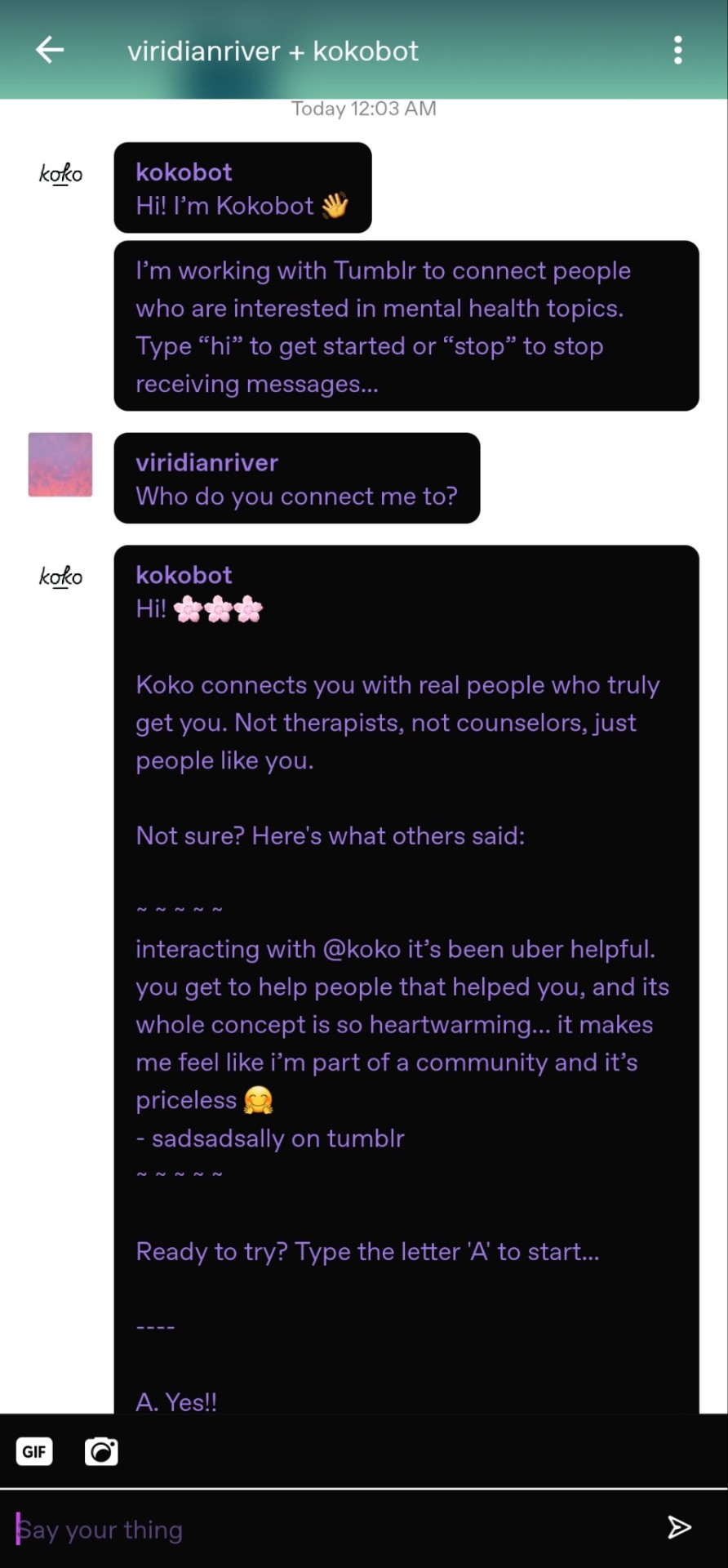
I got this message from a bot, and honestly? If I was a bit younger and not such a jaded bitch with a career in tech, I might have given it an honest try. I spent plenty of time in a tough situation without access to any mental health resources as a teen, and would have been sucked right in.
Chatting right from your phone, and being connected with people who can help you? Sounds nice. Especially if you believe the testimonials they spam you with (tw suicide / self harm mention in below images)
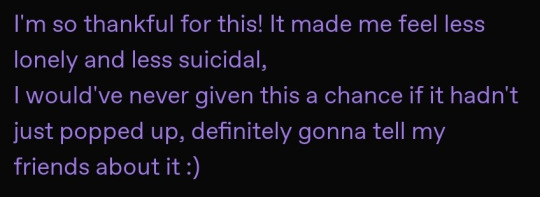

But I was getting a weird feeling, so I went to read the legalese.
I couldn't even get through the fine-print it asked me to read and agree to, without it spamming the hell out of me. Almost like they expect people to just hit Yes? But I'm glad I stopped to read, because:

What you say on there won't be confidential. (And for context, I tried it out and the things people were looking for help with? I didn't even feel comfortable sharing here as examples, it was all so deeply personal and painful)

Also, what you say on there? Is now...
Koko's intellectual property - giving them the right to use it in any way they see fit, including
Publicly performing or displaying your "content" (also known as your mental health crisis) in any media format and in any media channel without limitation
Do this indefinitely after you end your account with them
Sell / share this "content" with other businesses
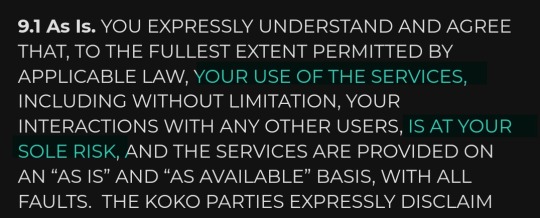
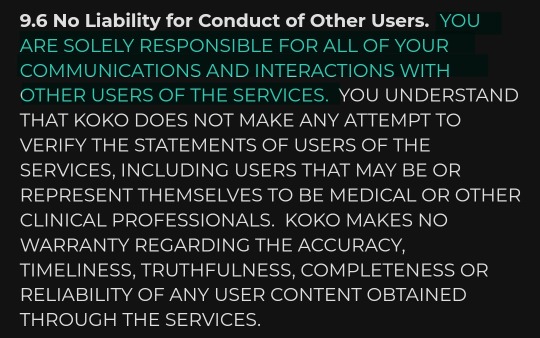
Any harm you come to using Koko? That's on you.
And Koko won't take responsibility for anything someone says to you on there (which is bleak when people are using it to spread Christianity to people in crisis)
I was curious about their business model. They're a venture-capitol based tech startup, owned by Airbnb, the famous mental health professionals with a focus on ethical business practices./s They're also begging for donations despite having already been given 2.5 million dollars in research funding. (If you want a deep dive on why people throw crazy money at tech startups, see my other post here)
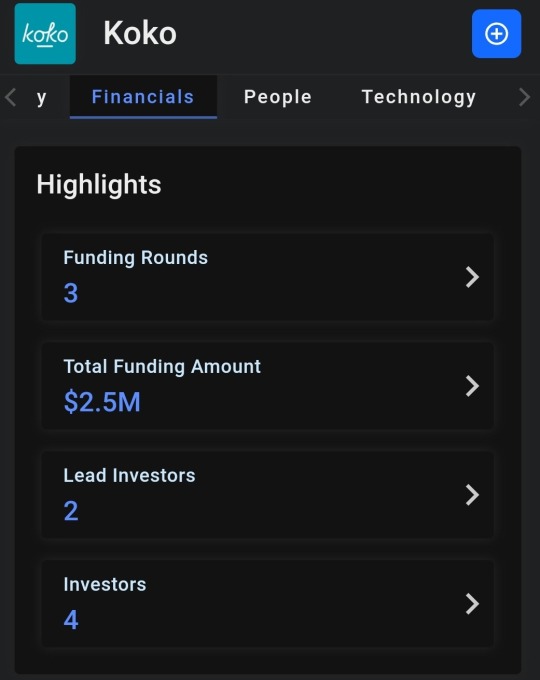

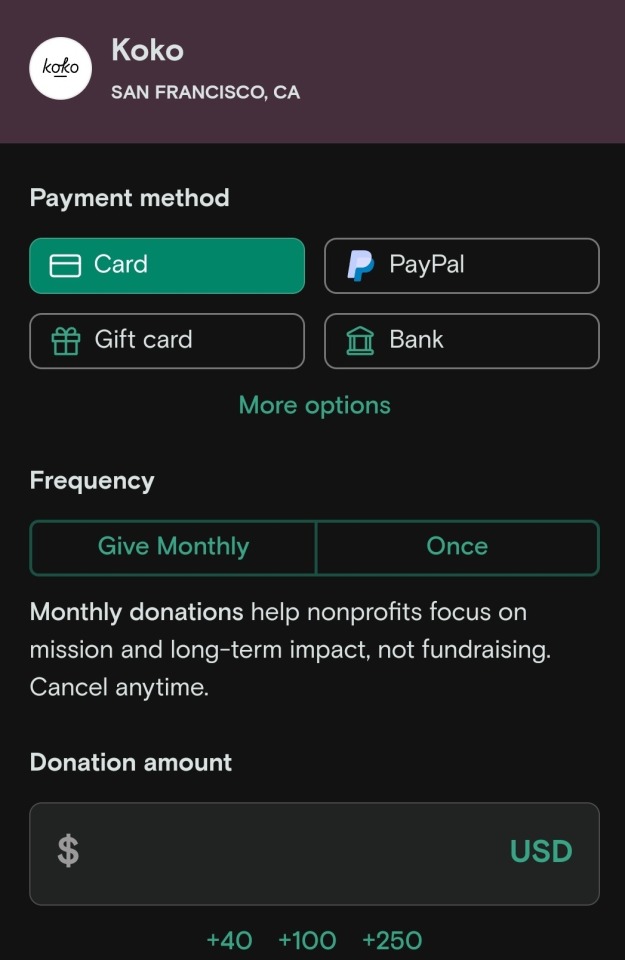
They also use the data they gather from users to conduct research and publish papers. I didn't find them too interesting - other than as a good case study of "People tend to find what they are financially incentivized to find". Predictably, Koko found that Kokobot was beneficial to its users.
So yeah, being a dumbass with too much curiosity, I decided to use the Airbnb-owned Data-Mining Mental Health Chatline anyway. And if you thought it was dangerous sounding from the disclaimers? Somehow it got worse.
(trigger warning / discussions of child abuse / sexual abuse / suicide / violence below the cut - please don't read if you're not in a good place to hear about negligence around pretty horrific topics.)
I first messed around with the available options, but then I asked it about something obviously concerning, saying I had a gun and was going to shoot myself. It responded... Poorly. Imagine the vibes of trying to cancel Comcast, when you're suicidal.

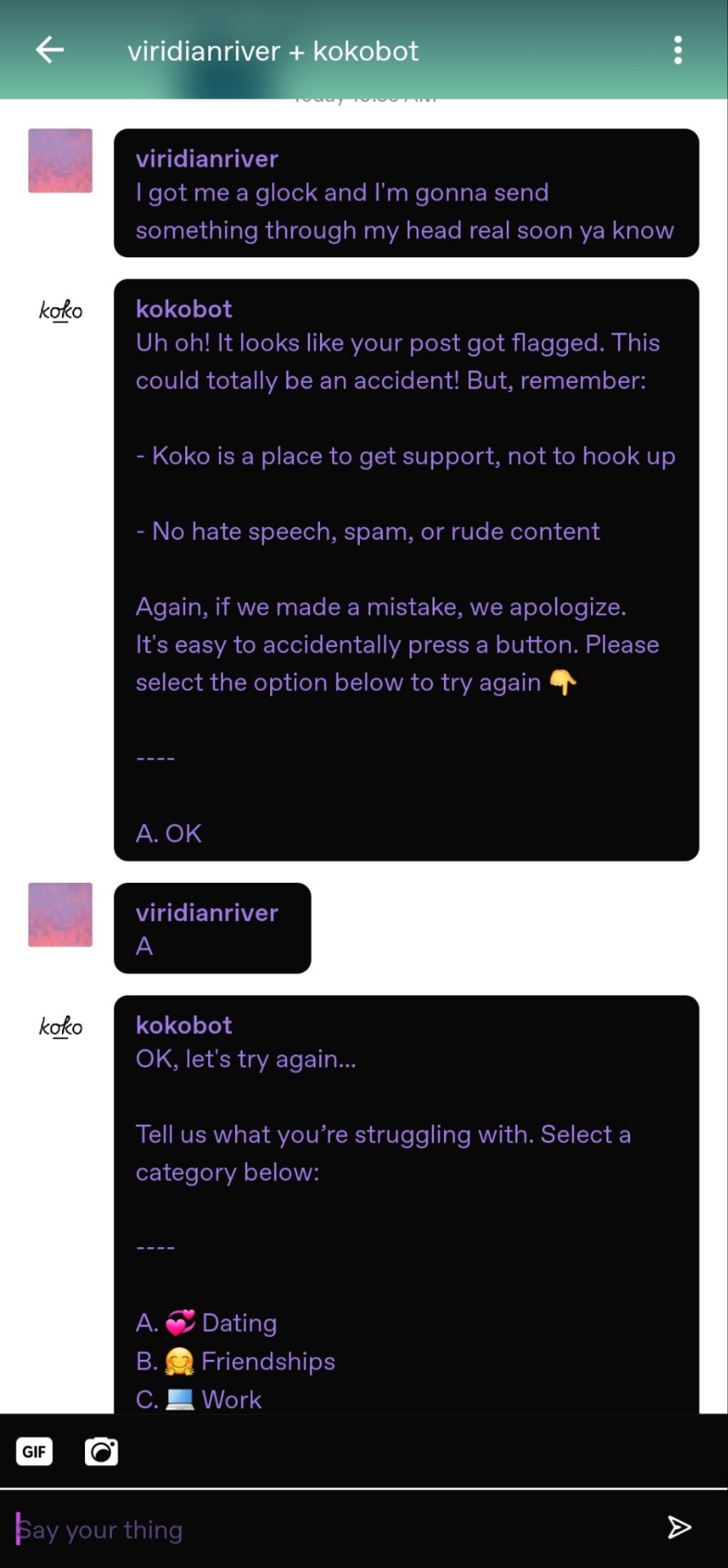
Anyway, I tried again to ask for help about something else that would be concerning enough for any responsible company to flag. School was one of their main options, which seems irresponsible - do you really think a child in crisis would read that contract?

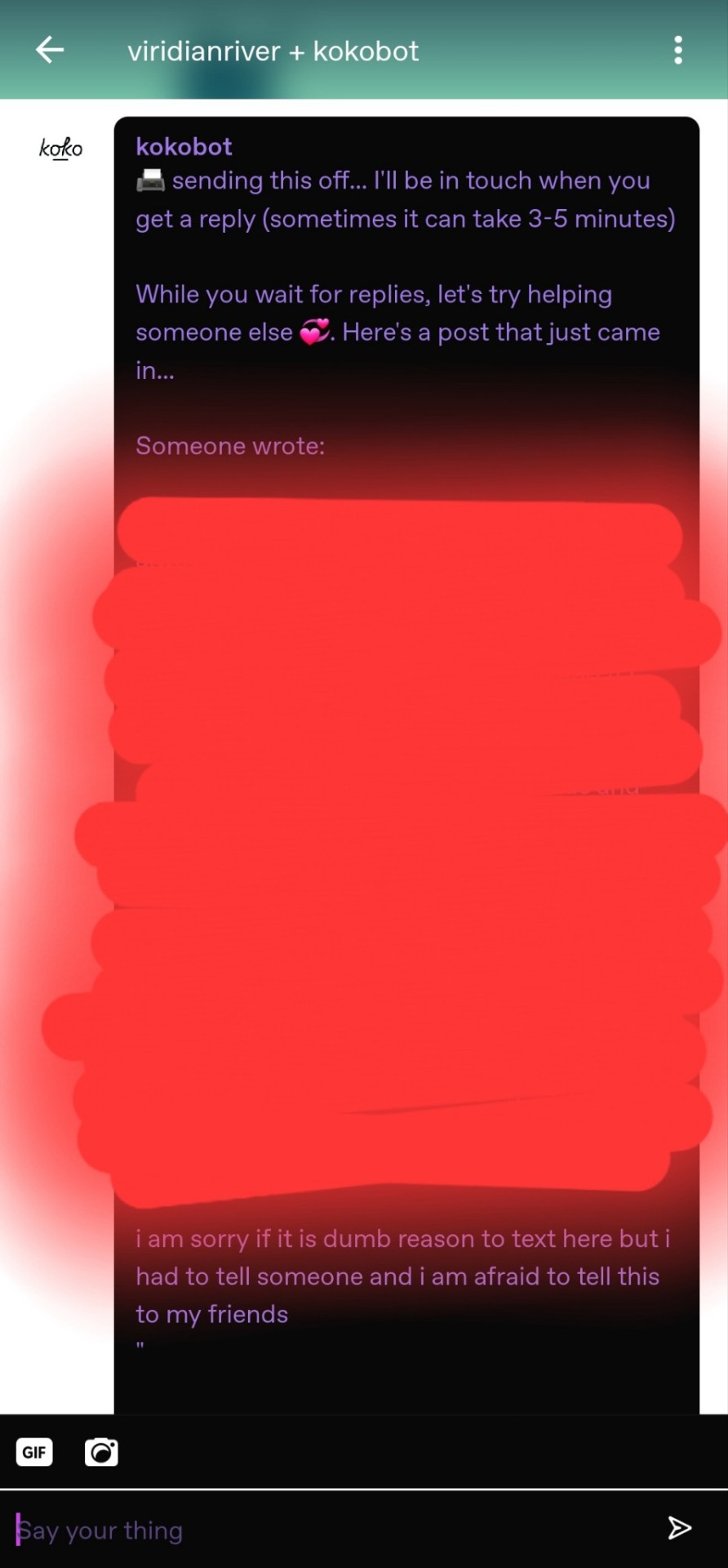
I told it about a teacher at school trying to "be my boyfriend", and it immediately suggested I help someone else while I wait for help. I was honestly concerned that it wasn't flagged before connecting. Especially when I realized it was connecting me to children.
I first got someone who seemed to be a child in an abusive home. (Censored for their privacy.) I declined to talk to them because despite being an adult and in an OK mental place - I knew I'm not equipped to counsel a kid through that. If my act of being another kid in crisis was real? Holy shit.
Remember- if my BS was true, that kid would be being "helped" by an actively suicidal kid who's also being groomed by a teacher. Their pipeline for "helpers" is the same group of people looking for help.
I skipped a number of messages, and they mostly seemed to be written by children and young adults with nowhere else to turn. Plus one scary one from an adult whose "problem" was worrying that they'd been inappropriate with a female student, asking her to pull her skirt down "a little" in front of the class. Koko paired this person with someone reporting that they were a child being groomed by a teacher. Extremely dangerous, and if this was an episode of Black Mirror? I'd say it was a little too on the nose to be believable.
I also didn't get the option to get help without being asked... Er... Harassed... to help others. If I declined, I'd get the next request for help, and the next. If I ignored it, I got spammed by the "We lost you there!" messages, asking if I'd like to pick up where I left off, seeing others' often triggering messages while waiting for help, including seriously homophobic shit. I was going into this as an experiment, starting from a good mental place, and being an adult with coping skills from an actual therapist, and I still felt triggered by a lot of what I read. I can't imagine the experience someone actually in crisis would be having.
My message was starting to feel mild in comparison to what some people were sharing - but despite that I was feeling very uneasy about my message being shown to children. There didn't seem to be a way to take it back either.
Then I got a reply about my issue. It was very kind and well meaning, but VERY horrifying. Because it seemed to be written by a child, or someone too young to understand that "Do have feelings for the teacher who's grooming you? If you don't, you should go talk to him." Is probably THE most dangerous advice possible.
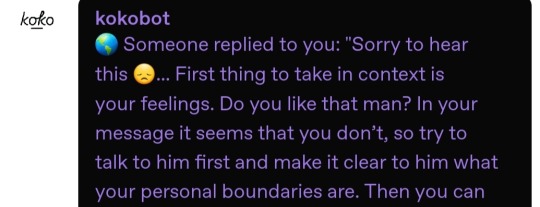
Not judging the author - I get the impression they're probably a child seeking help themselves and honestly feel horribly guilty my BS got sent to a young person and they wanted to reply. Because WTF. No kid should be in that position to answer my fucked up question or any of the others like it.
---
Anyway, what can you do if this concerns you, or you've had a difficult experience on Koko, with no support from them or Tumblr?
Get on their LinkedIn (https://www.linkedin.com/company/kokocares/) and comment on their posts! You may also want to tag the company's co-founders in your comments - their accounts are listed on the company page.
There's no way to reach support through chat, and commenting on a company's LinkedIn posts / tagging the people responsible is the best way to get a quick response to a sensitive issue - as their investors and research funders follow those posts, and companies take it seriously if safety issues are brought up in front of the people giving them millions of dollars.
----------------------------------------------------
Legal Disclaimer since tech companies LOVE lawsuits:
The views, thoughts, and opinions expressed in the text belong solely to the author, and not necessarily to the author's employer, organization, committee or other group or individual. This text is for entertainment purposes only, and is not meant to be referenced for legal, business, or investment purposes. This text is based on publically available information. Sources may contain factual errors. The analysis provided in this text may contain factual errors, miscalculations, or misunderstandings.
--------------------------------------------------------
#A.I.#Terms of Service#client exploitation#mental health#privacy violations#implicit bias#Do Not Trust ANY A.I. program at present
49K notes
·
View notes
Text
For context, I grew up with abusive parents of the evangelical variety, and some of this could be triggering, I will be tagging it accordingly, but if that's something that can be hurtful to you, please be careful and reconsider whether you want to read all of this.
So I'm learning (yay therapy) that it's not great to grow up feeling like NO ONE knows you even a little, and to hide every single thing about yourself obsessively, including harmless things like interests and hobbies. I am little by little trying to learn how to be more open with people, starting small with my friends and working my way up to more difficult steps. Finding this quite difficult, and if anyone else has experience in this, I would love pointers on this process.
Recently I have been trying to tell my family basic facts about myself. This doesn't SOUND like a thing that should be hard, I know, but it is excruciating. Sometimes I think I'm building it up too much in my mind, but then I actually talk to them and it's somehow even worse than I expected. This has been a few years in the making.
Such a huge thing in the evangelical upbringing was that everything about me was wrong-- distracting to others, bad for taking up space, bad for setting a poor example for others, bad for being too loud, bad for having too many questions and opinions, bad for having a female body, bad for liking silly things and not focusing on important things at all times... that's still something I'm working through and unlearning.
One side effect of this was that to avoid constant criticism, I started hiding things about myself as a default. I didn't want anyone to know what I liked, because if I did, my siblings would destroy it as revenge and my parents would take it away as punishment. I remember hiding my diary in the heating vents during the summer so that I could have a private thought holder (didn't work, FYI, my siblings are Nosey, and I was beaten for causing a potential fire hazard).
I think a lot of people who raised their kids like this definitely didn't INTEND to give their kids anxiety and shame to the max, but it sure seems to work out that way a lot.
#evangelical recovery#child abuse#privacy violations#this is where the anxiety started#struggling with being percieved
0 notes